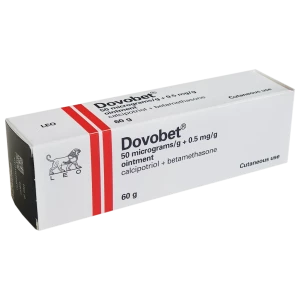Psoriasis
Psoriasis is a chronic autoimmune skin condition that affects approximately 1.3% of the UK population. It causes red, flaky, and often itchy patches of skin, impacting both physical comfort and emotional well-being. A timely diagnosis is crucial for effective treatment that aims to control symptoms and improve quality of life.
Dovobet Gel
- Regulates the growth of skin cells
- Calcipotriol and betamethasone
- Fast relief
Dovonex Ointment
- Topical treatment for psoriasis
- Contains the active ingredient calcipotriol
- Prescription-only medication
What is Psoriasis?
Psoriasis is a chronic skin condition that affects millions of people worldwide. Symptoms include red, flaky patches of skin, which can be itchy and physically uncomfortable. In addition to the physical symptoms, psoriasis can lead to emotional distress, with conditions like low self-esteem and even depression arising as a result.
In the UK, approximately 1.3% of the population, or around 884,000 people, are affected by psoriasis—an autoimmune skin condition that can also affect joints and nails. A proper diagnosis is crucial for starting treatment as soon as possible, which can alleviate painful physical symptoms and aid in better mental health.
What Causes Psoriasis?
Although the exact cause of psoriasis remains under investigation, it is believed to result from a combination of genetic factors and environmental triggers, such as stress, infections, and certain medications. The immune system plays a significant role, as overactive T-cells lead to the rapid reproduction of skin cells, causing the skin to become thick and develop red, itchy plaques.
Genetic factors can also contribute to your likelihood of developing psoriasis. A family history of the condition generally increases your risk, although it is not inevitable.
What Are The Types of Psoriasis?
Psoriasis manifests in various forms, each with its distinct symptoms and treatment options. The five main types of psoriasis include:
- Plaque psoriasis: The most common form, featuring well-defined, red plaques covered in silver scales.
- Guttate psoriasis: Typically affects children and young adults, presenting as small, pink, tear-drop-shaped lesions.
- Inverse psoriasis: Affects skin folds like the armpits, beneath the breasts, and the groin, with smoother but still red patches.
- Pustular psoriasis: Characterised by pus-filled blisters on the body.
- Erythrodermic psoriasis: The rarest and most severe form, causing widespread redness and skin shedding.
How is Psoriasis Diagnosed?
Diagnosis generally involves a physical examination and a review of the patient's medical history. In some cases, a skin biopsy may be performed to confirm the diagnosis and rule out other skin conditions.
How is Psoriasis Treated?
Treatment aims to manage symptoms, reduce inflammation, and prevent flare-ups. Common treatment methods include topical creams, light therapy, and medication. Specific products, like Dovobet Gel, may be prescribed, but each treatment plan is individualised, making it essential to consult a healthcare provider rather than attempting to self-medicate.
How to Prevent Psoriasis
While psoriasis cannot be entirely prevented, flare-ups can be managed through various strategies. Stress management, avoiding known triggers like infections and certain medications, and maintaining a healthy lifestyle can all contribute to better management of psoriasis. Collaborating with your healthcare providers and following a tailored treatment plan can make a significant positive impact.
Authored By

Lisamarie Lamb
Medical Content WriterPublished on: 30/10/2023
Reviewed By

Dr Giuseppe Aragona
DoctorReviewed on: 31/10/2023
© 2013 - 2026 Al Muhsineen Limited. All Rights Reserved. Registered Pharmacy: 34 Halliwell Road, Bolton BL1 8RL. Registered Office: 254 First Floor, Shearbrow, Blackburn, England, BB1 8DS







